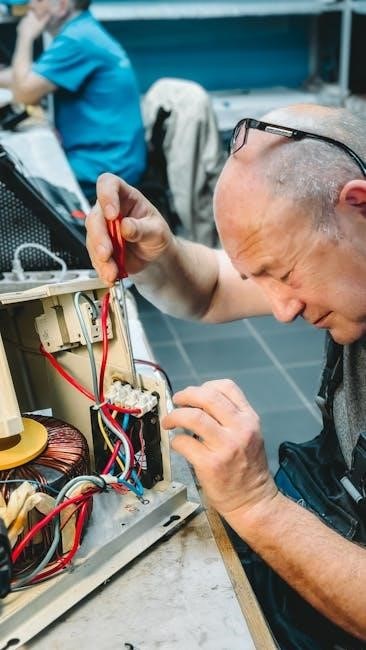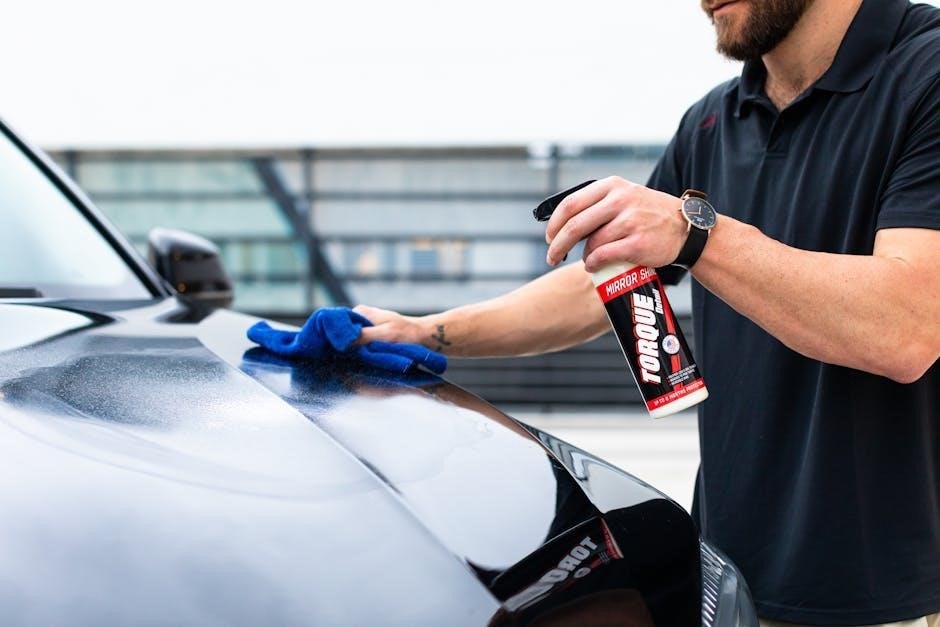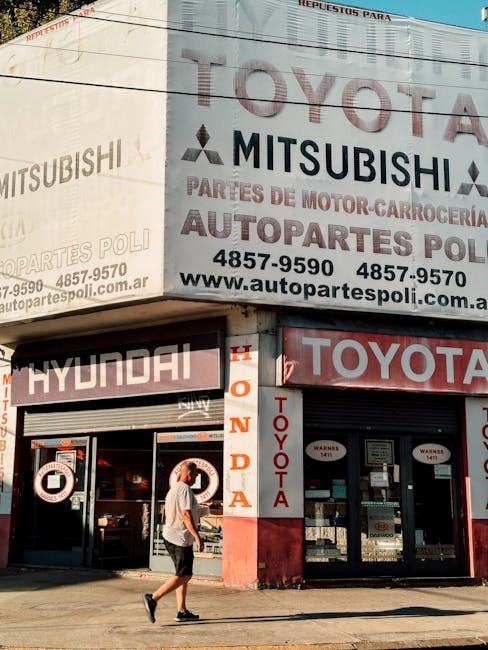The 2018 Toyota Camry maintenance schedule provides a comprehensive guide for regular servicing, ensuring optimal performance, fuel efficiency, and longevity․ Adhering to the recommended intervals helps maintain warranty coverage and prevents potential issues․ Proper upkeep includes oil changes, tire rotations, and inspections, tailored to your driving habits․ Regular maintenance ensures reliability and safety on the road․
Overview of the Importance of Regular Maintenance
Regular maintenance is crucial for ensuring the longevity, performance, and safety of your 2018 Toyota Camry․ By following the recommended schedule, you can prevent minor issues from escalating into costly repairs․ Proper upkeep also enhances fuel efficiency and overall vehicle reliability․ Toyota has designed the maintenance intervals to address specific components at certain milestones, ensuring everything functions optimally․ Neglecting routine checks can lead to premature wear, reduced performance, and even safety hazards․ Additionally, maintaining a consistent service record is essential for preserving your vehicle’s warranty and resale value․ Regular inspections and timely replacements help keep your Camry running smoothly for years to come․

Understanding the 2018 Toyota Camry Maintenance Schedule PDF
The PDF guide provides a detailed roadmap for servicing your Camry, outlining essential checks, replacements, and intervals․ It ensures your vehicle receives the right care at the right time, optimizing performance and durability while preventing unexpected issues․ This official document is a crucial resource for every Camry owner, offering clear, manufacturer-recommended maintenance procedures to keep your car running smoothly and safely․
Key Components of the Maintenance Schedule
The 2018 Toyota Camry maintenance schedule is structured around essential service intervals and checks to ensure the vehicle operates efficiently․ It includes regular oil changes, tire rotations, and fluid level inspections․ The schedule also outlines specific milestones, such as every 5,000, 15,000, and 30,000 miles, where more detailed inspections and replacements are required․ Components like brake fluid, differential fluid, and the cooling system are highlighted for regular monitoring․ Additionally, the schedule emphasizes the importance of inspecting belts, spark plugs, and air filters at designated intervals․ By following these guidelines, owners can maintain their Camry’s performance, prevent costly repairs, and ensure safety on the road․ Proper adherence to the schedule also supports warranty coverage and long-term vehicle reliability․
How to Access the Official Toyota Camry Maintenance Guide
To access the official 2018 Toyota Camry maintenance guide, visit Toyota’s website or refer to the owner’s portal․ The guide is available as a downloadable PDF, providing detailed schedules and procedures․ You can also contact an authorized Toyota dealership for a printed copy or digital access․ Additionally, the guide is typically included with the vehicle’s documentation upon purchase․ Ensure you reference the correct model year and configuration for accurate information․ This resource is essential for understanding service intervals, recommended procedures, and warranty requirements, helping you keep your Camry in optimal condition throughout its lifespan․

Basic Maintenance Services
Regular maintenance ensures the 2018 Toyota Camry runs smoothly, with services like oil changes, tire rotations, and fluid checks․ These routine tasks promote reliability and safety․
Every 5,000 Miles Service Requirements
The 2018 Toyota Camry requires essential maintenance every 5,000 miles to ensure optimal performance․ This service includes oil and filter replacement, tire rotation, and a thorough inspection of fluid levels․ The technician will check the engine oil, coolant, brake fluid, and transmission fluid, topping them off as needed․ Additionally, the tire pressure will be adjusted to the recommended levels, and the tires will be rotated to ensure even wear․ A visual inspection of belts, hoses, and other components is also performed to identify any potential issues early․ Adhering to this schedule helps prevent mechanical failures and maintains the vehicle’s efficiency and longevity․ Regular maintenance is crucial for preserving your Camry’s health and ensuring a smooth driving experience․
Fluid Level Checks and Adjustments
Fluid level checks are a critical part of maintaining the 2018 Toyota Camry․ During each service interval, technicians inspect the engine oil, coolant, brake fluid, and transmission fluid levels․ They ensure these fluids are within the recommended range and free from contamination․ If any fluid is low, it is topped off to the specified level․ Additionally, the condition of each fluid is evaluated; for example, brake fluid clarity and coolant pH levels are checked․ Proper fluid levels and conditions are essential for preventing overheating, corrosion, and wear on critical components․ Regular fluid checks help maintain the vehicle’s performance, efficiency, and longevity․ This step is vital for identifying potential issues before they escalate․ Consistent monitoring ensures the Camry operates smoothly and reliably․
Tire Rotation and Pressure Monitoring
Tire rotation and pressure monitoring are essential for maintaining the 2018 Toyota Camry’s performance and safety․ The recommended tire rotation interval is every 5,000 miles to ensure even tread wear and extend tire life․ Proper tire pressure should be checked monthly and before long trips, using the pressures specified in the owner’s manual or tire information placard․ Underinflated tires can lead to reduced fuel efficiency, uneven wear, and increased risk of damage․ Regular rotation and pressure checks help maintain optimal handling, traction, and braking performance․ This practice also contributes to better fuel efficiency and overall vehicle safety․ Adhering to these guidelines ensures your Camry remains reliable and performs at its best․ Proper tire maintenance is a key part of the vehicle’s upkeep schedule․

Intermediate Maintenance Services
Intermediate maintenance for the 2018 Toyota Camry is recommended every 15,000 miles․ This service includes inspections of brake fluid, differential fluid, and the cooling system to ensure optimal performance and prevent issues․ Regular checks help maintain the vehicle’s reliability and safety on the road․
Every 15,000 Miles Service Requirements
At every 15,000 miles, the 2018 Toyota Camry requires intermediate maintenance to ensure optimal performance․ This service includes inspecting the brake fluid and differential fluid levels, checking the cooling system for leaks or damage, and examining the air filter for cleanliness․ Additionally, the tire rotation is recommended to ensure even tread wear, and the drive belts are inspected for signs of cracking or wear․ These checks help prevent potential issues and maintain the vehicle’s reliability․ Following this schedule ensures your Camry continues to run smoothly, providing consistent performance and fuel efficiency while adhering to Toyota’s recommended maintenance guidelines․
Brake Fluid and Differential Fluid Inspection
Inspecting the brake fluid and differential fluid is crucial for maintaining the 2018 Toyota Camry’s performance and safety․ Brake fluid levels should be checked for consistency and contamination, as moisture or debris can compromise braking efficiency․ Differential fluid, essential for the drivetrain, must be examined for cleanliness and proper viscosity; Both fluids should be free from leaks and degradation․ If contaminants or low levels are detected, immediate action is required to prevent system failure․ Regular inspections at recommended intervals ensure smooth braking and drivetrain operation, enhancing overall vehicle reliability and safety․ Neglecting these checks can lead to costly repairs and compromised safety features․
Cooling System and Air Filter Inspection
The cooling system and air filter inspection are vital for ensuring the 2018 Toyota Camry operates efficiently․ The cooling system, including the coolant level, belts, and hoses, should be inspected every 15,000 miles to prevent overheating and engine damage․ The air filter, which affects fuel efficiency and performance, should also be checked and replaced if dirty or clogged․ Proper maintenance of these components ensures optimal engine temperature regulation and airflow, enhancing overall vehicle performance․ Neglecting these inspections can lead to decreased fuel efficiency, increased emissions, or even costly engine repairs․ Regular checks help maintain the longevity and reliability of your Camry․

Major Maintenance Services
Major maintenance services for the 2018 Toyota Camry are essential for long-term performance and reliability․ These services typically occur at higher mileage intervals and involve critical system checks and replacements, ensuring the vehicle continues to run smoothly and efficiently․ Regular major maintenance helps prevent costly repairs and maintains the overall health of the engine and other vital components․ By following the recommended schedule, owners can ensure their Camry remains in optimal condition for years to come․
Every 30,000 Miles Service Requirements
At 30,000 miles, the 2018 Toyota Camry requires essential maintenance to ensure optimal performance․ This service includes replacing the spark plugs, which is crucial for maintaining proper engine combustion and efficiency․ Additionally, the engine oil and filter are changed to keep the engine lubricated and running smoothly․ The drive belts are also inspected for wear and tear, and the engine air filter is replaced if necessary․ Furthermore, the transmission fluid is typically replaced at this interval to maintain smooth gear transitions․ Brake fluid and differential fluid levels are checked and topped off as needed․ Following these requirements helps prevent premature wear and ensures the vehicle operates at its best for years to come․
Spark Plug Replacement and Belt Inspections

At 30,000 miles, the 2018 Toyota Camry requires spark plug replacement to ensure proper engine combustion and efficiency․ Worn spark plugs can lead to reduced performance, lower fuel efficiency, and potential engine misfires․ During this service, technicians also inspect the serpentine belt and other drive belts for cracks, wear, or damage․ If any belts show signs of deterioration, they are replaced to prevent sudden breakdowns․ This maintenance interval is crucial for maintaining engine health and preventing costly repairs․ Regular inspections and replacements help ensure smooth operation and reliability․ Proper belt tension is also checked to avoid premature wear on related components․
Engine and Transmission Fluid Replacement
Engine and transmission fluid replacement is a critical part of the 2018 Toyota Camry’s maintenance schedule, typically required at the 30,000-mile mark․ Fresh engine oil ensures optimal lubrication, preventing overheating and wear on internal components․ Transmission fluid replacement maintains smooth gear transitions and prevents corrosion․ During this service, technicians also inspect the cooling system and belts for signs of wear․ Proper fluid levels and condition are essential for sustained performance and fuel efficiency․ Using Toyota-approved fluids is recommended to ensure compatibility and longevity․ Regular fluid replacements help prevent premature system failures and maintain the vehicle’s overall health․ This service is vital for preserving the engine and transmission’s reliability over time․

Additional Maintenance Considerations
Regular inspections of the timing belt, SRS airbag system, and axle components ensure long-term reliability and safety, complementing the routine maintenance schedule․
Timing Belt Replacement Intervals
The 2018 Toyota Camry timing belt should be inspected at 72 months (6 years) and replaced every 12 months thereafter if signs of wear are present․ Proper replacement intervals ensure engine reliability and prevent costly damage․ Failure to replace the timing belt as recommended can lead to engine failure, requiring expensive repairs․ Always refer to the official maintenance guide for precise scheduling․ Additionally, the SRS airbag and seat belt pretensioner systems must be serviced by a qualified technician or Toyota dealer before any timing belt work begins․ Adhering to these intervals guarantees optimal vehicle performance and safety over time․
SRS Airbag and Seat Belt Pretensioner Maintenance
The SRS airbag and seat belt pretensioner systems in the 2018 Toyota Camry require periodic inspections to ensure proper function․ These critical safety features must be serviced exclusively by a qualified technician or Toyota dealer․ Any work involving the SRS system, such as timing belt replacement, requires prior deactivation to avoid accidental deployment․ If the SRS warning light illuminates, immediate professional attention is necessary to diagnose and repair issues․ Proper maintenance ensures the systems operate reliably in emergencies․ Always adhere to Toyota’s guidelines to maintain safety and warranty validity․ Regular checks help prevent malfunctions and ensure occupant protection․ Professional servicing is essential for these advanced safety systems․
Skid Plate and Axle Boot Inspection
The skid plate and axle boots on the 2018 Toyota Camry are essential for protecting vital components from damage․ Regular inspections ensure the skid plate remains securely fastened and free from damage, while axle boots are checked for cracks or tears that could expose the drive axles to contaminants․ Inspections are typically recommended every 15,000 miles or when driving conditions involve rough terrain or extreme weather․ Damaged components should be repaired promptly to prevent costly damage․ Proper maintenance ensures long-term durability and prevents premature wear on suspension and drivetrain systems․ Always refer to the official Toyota Camry maintenance guide for detailed inspection procedures and intervals․
Maintenance Record-Keeping and Warranty
Maintaining detailed service records is crucial for warranty claims and resale value․ The 2018 Toyota Camry warranty covers parts and repairs for a specified period, ensuring protection against defects․ Authorized dealers play a key role in validating maintenance history and processing warranty claims efficiently․
Importance of Maintaining Service Records
Maintaining detailed service records for your 2018 Toyota Camry is essential for ensuring compliance with the recommended maintenance schedule and maximizing warranty benefits․ These records provide a clear history of all performed services, which can significantly enhance resale value by demonstrating responsible ownership․ Additionally, service records serve as proof of proper care, which may be required for warranty claims or disputes․ They also help track upcoming maintenance needs, ensuring no critical services are overlooked․ By keeping organized records, you can avoid potential issues and ensure your vehicle remains in optimal condition․ This practice not only protects your investment but also provides peace of mind for years to come․
Toyota Camry Warranty Overview

The 2018 Toyota Camry comes with a comprehensive warranty program designed to protect your investment․ The basic warranty covers 3 years or 36,000 miles, while the powertrain warranty extends to 5 years or 60,000 miles․ This coverage ensures that critical components are protected against defects in materials and workmanship․ Additionally, Toyota offers a rust-through corrosion warranty for 5 years, regardless of mileage․ Proper maintenance, as outlined in the schedule, is essential to uphold warranty validity․ Using genuine Toyota parts and adhering to recommended service intervals helps maintain coverage․ This warranty program underscores Toyota’s commitment to reliability and customer satisfaction, providing peace of mind for owners․
Role of Authorized Dealers in Maintenance
Authorized Toyota dealers play a crucial role in maintaining your 2018 Camry by providing expert service and ensuring compliance with the recommended maintenance schedule․ Dealerships are equipped with certified technicians, specialized tools, and genuine Toyota parts to deliver high-quality service․ They can perform detailed inspections, diagnose issues, and address any potential problems early․ Additionally, authorized dealers maintain accurate service records, which are essential for warranty coverage․ They also offer customized maintenance plans tailored to your driving habits․ By visiting an authorized dealer, you ensure that your vehicle receives the care it needs to maintain its performance, reliability, and resale value․ This support is a key part of the ownership experience․
Proper maintenance ensures the 2018 Toyota Camry performs optimally, maintaining reliability and longevity․ Adhering to the schedule provides peace of mind and preserves your vehicle’s value over time․
Final Thoughts on Proper Vehicle Maintenance
Proper vehicle maintenance is crucial for the longevity and performance of your 2018 Toyota Camry․ Regular servicing ensures your car runs efficiently, safely, and reliably․ By following the recommended maintenance schedule, you can prevent unexpected repairs, maintain fuel efficiency, and uphold your vehicle’s warranty․ It’s essential to keep track of service records and address any issues promptly․ Consistent care not only enhances your driving experience but also preserves the value of your Camry․ Remember, a well-maintained vehicle is a safe and dependable companion on the road․

Leave a Reply